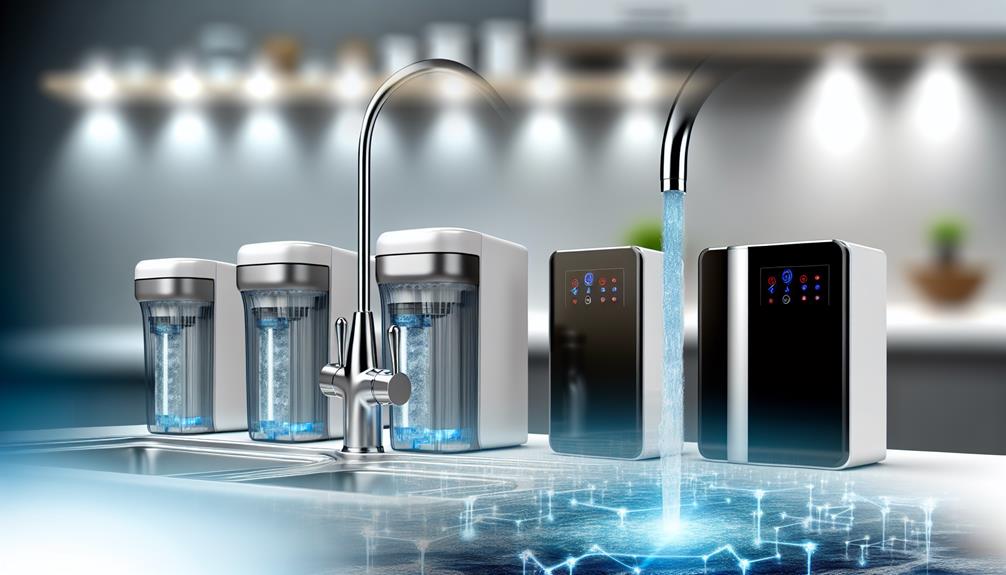As you gaze upon the crystal-clear stream meandering through a verdant valley, it's hard to imagine that such pristine water could ever be sullied. Yet, the reality is that even the most untouched sources can harbor unseen contaminants, a challenge that pioneers in the field of water purification are tirelessly combating.
Companies like Evoqua Water Technologies, Whirlpool Corporation, and 3M are at the forefront, introducing innovative filtration systems that not only promise to strip water of impurities but also do so in increasingly sustainable ways. Their commitment to integrating smart technology and the Internet of Things (IoT) into their systems is transforming how you monitor and control the very lifeblood of your home.
As they continue to develop groundbreaking methods, such as advanced desalination techniques and the use of nanotechnology, one can't help but wonder: what revolutionary breakthroughs lie just over the horizon? Join the discussion to find out how today's visionaries are crafting tomorrow's solutions to one of humanity's most enduring needs.
Revolutionary Filtration Technologies
As we delve into the realm of revolutionary filtration technologies, it's essential to understand how the synergy of activated carbon, reverse osmosis, and UV sterilization dramatically enhances water purity.
Activated carbon acts as a porous adsorbent, trapping organic compounds and chlorine. Reverse osmosis, a cornerstone of advanced filtration systems, employs a semi-permeable membrane to remove a vast array of contaminants, including dissolved salts and bacteria. UV sterilization complements these processes by deploying ultraviolet light to eradicate microorganisms, ensuring a comprehensive purification solution.
The integration of new technologies, such as AI, takes these systems a step further. With artificial intelligence, you get real-time monitoring and automatic adjustments to the filtration process, guaranteeing the consistent quality of your water. Furthermore, the inclusion of IoT enables remote management of water purifiers, providing insights into filter efficiency and timely maintenance notifications.
In response to growing environmental concerns, there's a shift toward sustainable options. New models aren't only energy-efficient but also incorporate renewable sources and biodegradable materials. This conscientious approach aligns with the global imperative for sustainable solutions, addressing water scarcity and supporting a circular economy.
Sustainable Purification Pioneers
Sustainable purification pioneers are transforming the industry by harnessing renewable energy and developing biodegradable filtration components, thereby setting new benchmarks for eco-friendly water treatment. You're seeing a shift towards systems that leverage solar power to reduce reliance on conventional electricity, which diminishes the environmental impact of water purification processes.
These innovators aren't just tinkering around the edges; they're rethinking Water Technologies from the ground up. By integrating materials that naturally break down, they're ensuring that water purification doesn't compromise future sustainability. You can expect these advancements to continue as environmental sustainability takes center stage in societal priorities.
The pioneers in sustainable purification are creating products that aren't only effective but also energy-efficient. They're reducing electricity consumption without sacrificing performance. This dual focus on efficacy and efficiency is indicative of a maturing market, where consumers demand both clean drinking water and responsible consumption.
The key takeaway is that the future of Water Purification is intrinsically linked to the health of the planet. As you delve into the options available, you'll find that these pioneers are offering you choices that align with both your need for pure water and your desire to minimize your environmental footprint.
Smart Water Purification Systems
Smart water purification systems are revolutionizing access to clean water by integrating cutting-edge filtration technologies with user-friendly smart features. These systems harness sophisticated methods such as activated carbon, reverse osmosis (RO Systems), and UV sterilization to eradicate contaminants effectively, ensuring the provision of safe drinking water. The incorporation of smart technology and the Internet of Things (IoT) enhances functionality, enabling you to monitor water quality remotely, track filter life, and even utilize voice-activated controls.
In the sphere of sustainability, eco-conscious pioneers are shaping the industry by developing water purifiers that employ renewable energy sources, flaunt energy-efficient designs, and utilize biodegradable materials. These advancements contribute to a smaller ecological footprint while maintaining high water purification standards.
You're witnessing a dynamic expansion in the water purification market, with innovative desalination plants like those in Saudi Arabia and Israel, setting benchmarks in scale and efficiency. Looking ahead, the focus will pivot to reducing energy consumption and improving membrane technology, alongside exploring potential in solar desalination. Such progress is underpinned by collaborations that aim to refine practices, optimizing the marriage of technology and sustainability in smart water purification systems.
Breakthroughs in Desalination
Desalination technology has leapt forward, directly confronting global water scarcity by transforming seawater into potable water with increased efficiency and sustainability. At the core of this development in water purification is a wide range of advanced membrane technologies, which are pivotal in enhancing desalination processes. These membranes are engineered to require less energy while increasing yield, thereby addressing one of the primary challenges in desalination: high energy consumption.
In the realm of these technological strides, Israel's Hadera desalination plant stands out as a beacon of innovation. It exemplifies how substantial investments and focused research can lead to pioneering water technologies and solutions. The facility contributes significantly to the nation's water supply, emphasizing the critical role of desalination in ensuring water security.
Simultaneously, the United Arab Emirates and Saudi Arabia host some of the world's largest desalination plants. These massive operations underscore the scale at which desalination technology can be deployed to meet the water needs of countries with limited freshwater resources. They demonstrate the capacity of desalination to support not only domestic consumption but also agricultural and industrial sectors, proving its versatility and indispensability in the modern water landscape.
Nanotechnology in Water Treatment
Harnessing the power of nanotechnology in water treatment, scientists utilize nanoparticles to effectively target and eliminate a myriad of pollutants, revolutionizing the purification process with unparalleled precision and efficiency. The core of this technology lies in the materials' minuscule size, which grants a high surface area to volume ratio. This feature drastically enhances the adsorption, degradation, and capture of contaminants.
As you delve into the realm of nanotechnology in water treatment, you'll find that the capacity to pinpoint specific pollutants leads to a more meticulous cleanup. This specificity is a game-changer, particularly when confronting emerging contaminants that traditional methods may overlook. Industry leaders are capitalizing on these innovations, offering products that integrate nanotechnology to address complex water quality challenges.
Furthermore, the synergy between nanotechnology and renewable energy sources is paving the way for sustainable water treatment solutions. By harnessing solar, wind, or geothermal energy to power nanotechnological applications, the environmental footprint of water purification is significantly reduced. This approach not only provides cleaner water but does so by tapping into the bountiful energy provided by nature, setting a standard for eco-friendly practices in the industry.

